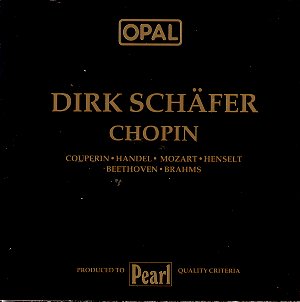This is the kind of release that reflects well on all
concerned. A grant from NOG Verzekeringen has enabled Pearl to produce,
on its Opal label, a superb conspectus of the art of Dirk Schafer (1873-1931),
a now little known pianist whose contrary career never took off in the
way it might have done. Schafer was a contemporary of Mengelberg and
they studied together at the Cologne Conservatoire. It was a four hand
piano fiasco at the Farewell dinner of students – Mengelberg effectively
elbowing Schafer off the keyboard – that led, it’s said, to the lifelong
enmity Schafer harboured toward the conductor. Carl Flesch, who knew
Schafer well, admired him and his compositions and was a sonata partner,
had some astute things to say about the pianist, though couched in his
forthright, not to say occasionally inflammatory, prose. Socially obstinate,
shy, suffering from a petty hatred of Mengelberg and a persecution mania
he was, Flesch maintained though not unkindly, a typical Dutch philistine.
But for all his provinciality, for all his irascibility, his historical
piano cycle – possibly inspired by Flesch’s own for violin a few years
before – was an outstanding event in Dutch musical life. His violin
sonata was dedicated to Flesch but this "hypochondriac with a heart
of gold", in Flesch’s words, never quite fulfilled his talents
as composer or, in the end, as a pianist. With this release though we
can appreciate the essential and undoubted rightness of Flesch’s evaluation
– this is a pianist of real stature, a musician of insight, an instrumentalist
of tremendous gifts.
Schafer’s 78s are now collectors' items and I’m not
sure that many, if any, have been reissued since their first appearance
in the early to mid twenties. More than half of the performances are
of Chopin and this is deeply persuasive Chopin playing. In the Nocturne
in F his treble is of fascinating clarity, of pearl-bejewelled translucence.
We can hear in the D minor Polonaise his remarkable ear for dynamics
and the Mazurka is simply beautifully played. The transposed Ecossaises
are lively, pliant and full of feeling whilst the Berceuse is effortlessly
and unselfconsciously despatched. He is never too fast for proper clarity
of articulation in the Impromptu in which he is musical without ostentation
and again his superfine ear for dynamic gradation is apparent. The Marche
Funèbre from the second Sonata is neither volcanic nor over-emoted
– tonal gradation scrupulously adhered to, though he has a tendency
to arpeggiate to excess here. If you know, say, Rubinstein’s 1964 live
Moscow performance you will not recognise in Schafer the colossal and
demonic that the Polish pianist favoured but you will admire the balance
of hands and the different aesthetic and emotional impulses involved.
Maybe there isn’t quite enough clarity to the melodic line in the A
minor Etude, though it is remarkable enough playing of a fiendish study.
In his electrical recordings, conjecturally from 1926, equal characteristics
are present. Listen to the sheer limpidity of phrasing in the Duport
Variations or how in the Henselt he utilises the most subtle rubati
and how supremely elegant is the plasticity of his phrasing.
The excellent notes are by Floris Juynboll, helpful
and intelligent, the copies used are in fine sound and the transfers
have been carried out with skill. A most distinguished release.
Jonathan Woolf


